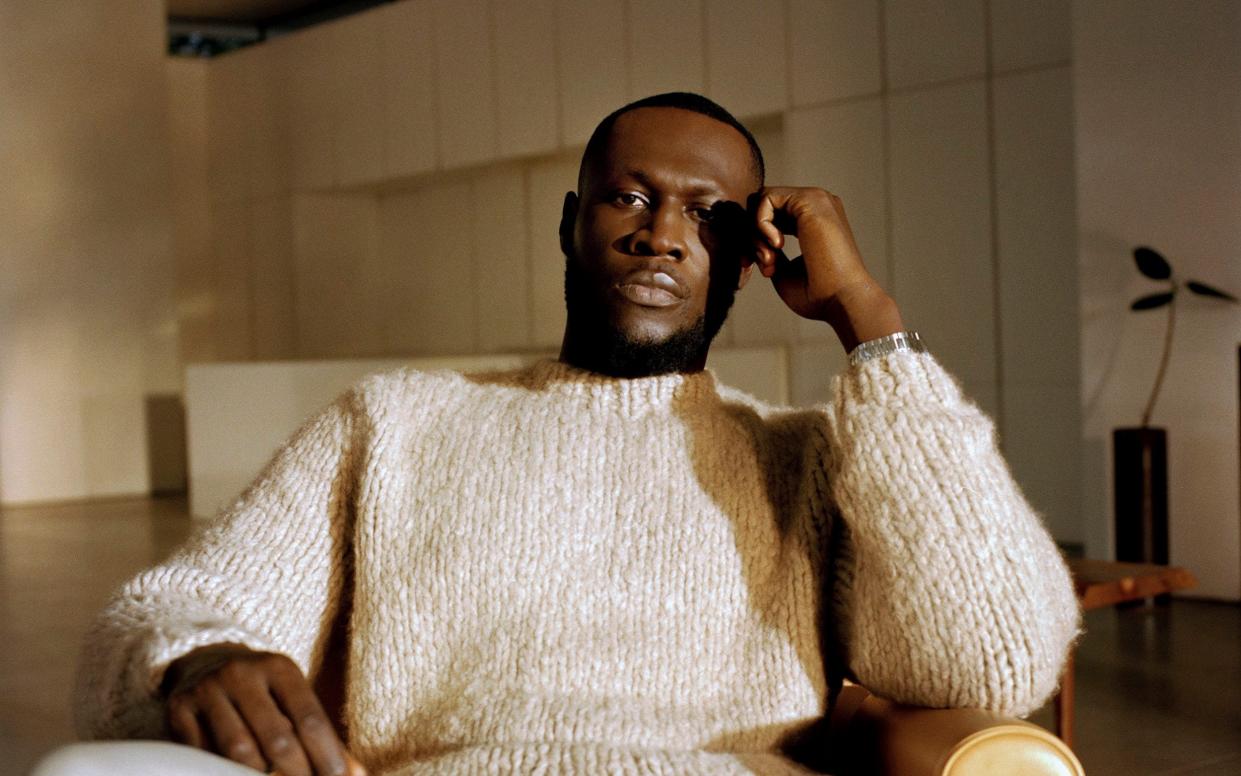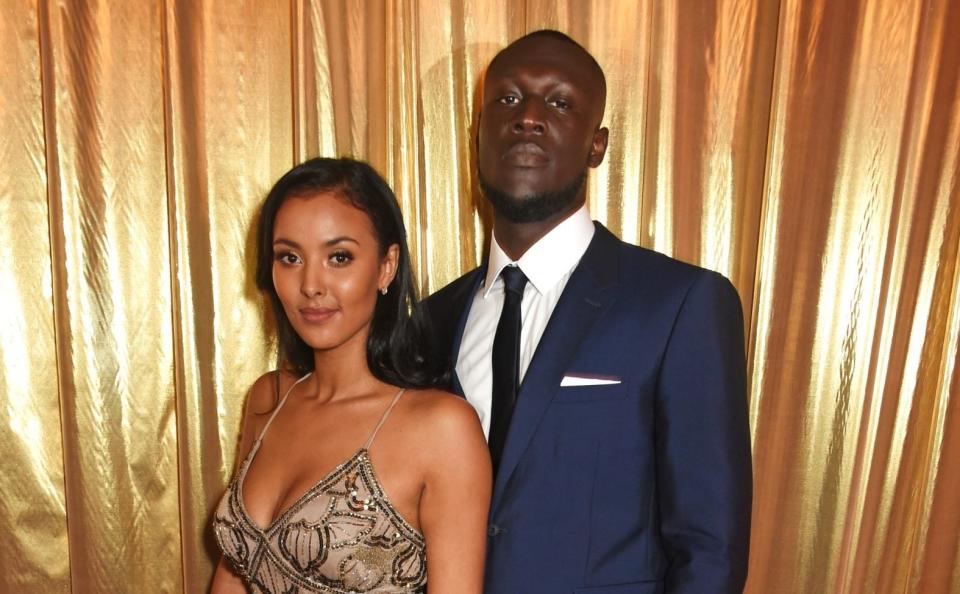With this powerful torch album, Stormzy abandons the macho to reveal rap’s soft side

Are you ready for Blood on the Raps? This is What I Mean is a moody, introspective, emotional third album of love, loss and philosophical reconciliation from Britain’s pre-eminent rapper, a set of hip hop torch songs in which Stormzy conjures his own take on such breakup classics as Bob Dylan’s Blood on the Tracks, Frank Sinatra’s Wee Small Hours or Marvin Gaye’s Here, My Dear.
Melancholic yet hopeful, ruminatively apologetic, intensely intimate and sensitive to the point of fragility, it is an album that sacrifices the innate swagger of rap to expose the vulnerability so often lurking beneath the genre’s boastful surface. It is a brave album, in many respects, and not least because it doesn’t really care what anyone makes of it. Like all great torch albums, it has been made with one, or perhaps two, listeners in mind: the singer and their lost love.
Stormzy towers head and shoulders above the UK rap scene, and not just because “Big” Michael Omari Owuo Jr. stands 6’5” and is built like a superhero. Rising up in 2015 as the most electrifying presence of the second wave of Grime just as it began to really impact on the mainstream, Stormzy is not just a multiple Brit award-winning artist with three UK number one singles and two chart topping albums, much admired and envied by his peers, but a serious, outspoken public figure recognisable even to people with little interest in pop music.
In the five years since the release of his debut album, Gang Signs & Prayers, he has headlined Glastonbury, Reading and Leeds festivals, launched a publishing imprint for underrepresented voices with Penguin, funded scholarships for black students going to Cambridge, pledged millions of pounds in annual endowments to charities fighting racial inequality, and spoken out against the government on issues ranging from school meals to the Grenfell disaster.
Yet such gravity has been counterbalanced by a sense of mischief, a comedic delight in his skills as a rapper who can fire out diss tracks packed with jokes and one-liners delivered with a knowing wink and a smile, as if giving himself permission to just have fun. His second album, 2019’s Heavy is the Head, certainly had a serious streak in its contemplations of power and responsibility, but it was also effectively Stormzy’s victory parade, huge in scale and packed with chart bangers including Own It, a superstar collaboration with Ed Sheeran and Burna Boy. The long gestating, covid-delayed This is What I Mean is something else entirely.
For one thing, whilst full of guest singers, there are no big stars, but rather expressive voices from the worlds of Afrobeat, gospel and R’n’B. They include Ayra Starr from Nigeria, Amaarae from Ghana, and from his native London we hear a lot of Stormzy’s soulful new protégé Debbie Ehirim and experimental, Mercury Prize-winning singer-songwriter Sampha. The latter delivers a spine-tingling reprise of tender prayer Please, in which Stormzy (not for the only time) throws himself on the mercy of his Lord, singing “I’m a sensitive soul, please, could you pause the applause? / Please could you let me be flawed? / Please leave your pain at the door / It’s too much in this house and I can’t bear anymore.”
A giveaway line from the title track is: “I think I’m Kanye mixed up with Donny Hathaway.” This is What I Mean aspires to the hip hop adventurousness of the former, and the romantic soulfulness of the latter. Stormzy does a lot of singing on this album, and while he certainly doesn’t have the honey tones of Hathaway, his soft, low and almost verging on flat delivery (heard before on gospel style tracks on earlier albums) has a lot of character and presence, carrying the emotions of thoughtfully crafted lyrics, and buoyed by the sweeter voices he surrounds himself with, who amplify and harmonise his lovely melodies.
Along with executive producer Kass Alexander aka Prgrshn, Stormzy has shaped a set of songs with a wide sonic range yet linked by a sombre quality, layered around piano played with chordal richness and occasional jazzy and classical flourishes, with strings, synths, organs, electric guitars and afrobeat percussion floating in and out of the mix. There are long passages without drums, so that the rhythm focusses on Stormzy’s flowing delivery. The tone of his voice is raw and unprocessed, his delivery almost mumblingly intimate, as if he’s rapping to himself, speaking his most private thoughts. It is very much a headphone album, rather than a dancefloor one.
This is new territory for a grime star, albeit Drake often flirts with such ruminatively introspective hip hop hurt, while Kanye West showed himself at his most romantically exposed on 2008’s 808s and Heartbreak. There are barely a handful of big rap songs, and none with the aggressive drive or cocky humour of Stormzy’s signature hits. Interestingly, Stormzy released a witty, pop culture referencing non-album single Mel Made Me Do It in September, as if to show he’s still got that in him. But his intention here is something other, the lengthy and ever so slightly more demonstrative raps of the title track and My Presidents Are Black effectively providing context for the emotional cut and thrust of Stormzy’s torch songs.

He still finds space for pop culture and political references, comparing himself to Harry Styles (“the way I fine line tread”) and Ed Sheeran (“I shine like Ed”), pleading for people to leave Meghan Markle alone, giving shout outs to author Zadie Smith alongside fellow rappers Dave and Giggs and mocking Boris Johnson’s Covid party rule breakers (“We got champagne bottles for them boys at number 10”).
These all reinforce notions of Stormzy as a champion of a black outsider class demanding respect and equality, but they are diversions from the main business of addressing the loss of a lifechanging heartbreak. Standout rap track, Bad Blood, abjectly apologises to an injured romantic party whilst seeking a healing space for self-recovery. The overwhelming mood is lovelorn and forlorn.
Holy Spirit is another big Stormzy gospel hymn that could easily fit into any contemporary church service. Honestly, has there been a major British pop star so unabashedly in thrall to God since Sir Cliff Richard? Metaphors of fire and water abound from opening breakup track Fire + Water, to naked love ballad Firebabe and closing song Give it to the Water, in which Stormzy makes it clear this water is holy: “It’s flowin’ and it’s showin’ me the way / Let it fill up the place / The water’s gonna wash away my pain.”

What Stormzy is striving for throughout is healing and transcendence, most powerfully on penultimate track, I Got My Smile Back, in which he addresses mental health issues in a long, revealing rap with deft lines about overcoming loneliness, depression, paranoia, self-doubt and even suicidal ideation (“Me and Suicidal Thoughts, we haven’t spoke for years / You know all my deepest secrets, you know all my fears / I pray that I don’t ever see your face again / me and Peace of Mind became the best of friends”).
This is What I Mean completely abandons the often very macho bullishness at the heart of hip hop, to show rap at its most sensitive. I can’t predict whether it will be a good commercial move for Stormzy or not, though I suspect he would find it hard to tour this set of downbeat, midtempo songs. Indeed, I wouldn’t be surprised if we get more music before he hits the road again.
But I would note that no British rapper has yet really broken America, because everything this country throws forward is effectively treated as a parochial reflection of the main US rap narrative. Stormzy at least has come up with his own distinctive angle, and pursued it to the nth degree, and that may work in his favour, particularly in a streaming world tailored to particular moods.
I wonder if Stormzy even cares how it is received by the public. The cover shows a letter on a doormat, and it is hard not to conclude that this is a missive intended principally for his ex: presenter and newly announced Love Island host Maya Jama, who Stormzy dated for four years, before they broke up in 2019. Recent reports have suggested that the couple may have recently got back together. In which case, listening to his tender torch album, one might conclude that it has already worked the only magic that really matters to its maker.
This is What I Mean is out now via Def Jam 0207


